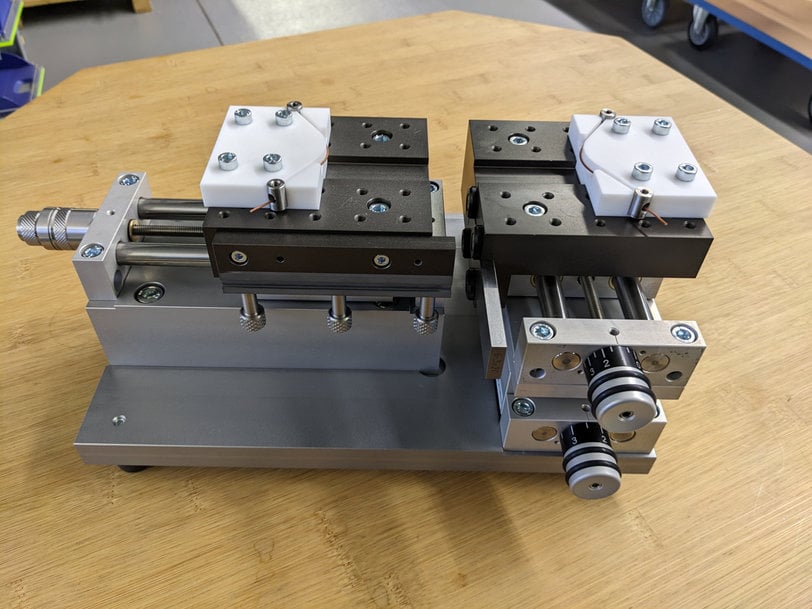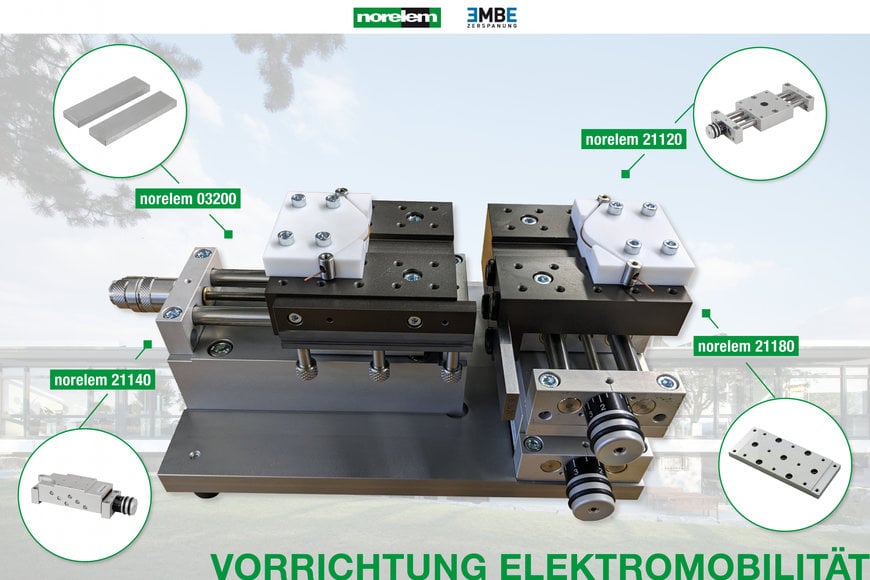Pushing the boundaries of electric vehicle cable testing
For electric vehicle (EV) owners and drivers, reliability is a vital element of e-mobility. Advances in cable testing enable manufacturers to improve their vehicles and their sustainability. Marcus Schneck, CEO of norelem, highlights how the company is playing a key role in supporting this aspect of the EV industry.
norelem.co.uk

While norelem has served the mechanical engineering industry for over 65 years, new markets and opportunities constantly arise. The electric vehicle industry is a great example of how norelem can bring its expertise to help specialist companies create new and better solutions.
A case in point is EMBE Machining, a precision machining specialist based in Markgröningen, Germany. EMBE leveraged norelem’s standardized components to develop an innovative measurement device to test cable insulation in EVs. norelem played a pivotal role in supporting EMBE’s engineering excellence to deliver this solution.
The Customer Story
Tracing its roots back to the 1950s, EMBE specializes in precision milling, turning, and drilling. The company uses its skill set to develop, design, and manufacture prototypes, individual components, series parts, and assemblies. It has built a reputation for highly accurate measurement tools, with customers in mechanical and medical engineering, the automotive and motorcycle industries, and the electronics sector.
EMBE was tasked with developing a measurement device to test the insulation capabilities of cables in electric vehicles. These current-carrying components must function reliably, even when experiencing extreme heat or cold temperatures. The aim was to provide accurate results that could enable the vehicle manufacturer to make cabling more compact, delivering a market advantage while conserving resources and supporting sustainability goals.
EMBE designed a device to accurately measure the insulation of two wires by applying a test voltage to one wire, which it then moved incrementally closer to another wire until the insulation was breached by an electrical arc. This indicates that the voltage is high enough to break through the wire's insulating sheath. The resulting current flow between the two wires signals that the insulation has failed and is no longer effective.
Achieving meaningful test results required multiple measurements under varying parameters, such as position, voltage, and temperature. In fact, the device’s mechanics had to enable a wide range of motion while ensuring high repeatability at ±0.02 mm.
Standard Components
Approximately two-thirds of the device is constructed using standardized components from norelem’s portfolio, while the remaining third comprises custom-made parts. Steel parallels from norelem act as reference plates for the dial gauge or for distance measurement, as the component needs to lie perfectly flat in order to deliver precise measurements. A lift table and a positioning table form the base, enabling precise height and Y-axis adjustments. These tables are connected into a unit via a mounting base plate, enabling horizontal and vertical movements.
The heart of the device is the second positioning table, which facilitates X-axis positioning. This component ensures the precise approach of the two wires. To achieve consistent results, the adjustment handle was replaced with a ratchet similar to a micrometer screw, allowing samples to be consistently pressed “to the block.” This distance serves as a zero reference. From precise positioning tables to reference plates, norelem’s high-quality parts ensured exceptional accuracy and repeatability, meeting the rigorous demands of insulation testing.
Leveraging norelem’s parts and expertise brought several advantages for EMBE. Michael Pieske, project manager at EMBE Machining, cited three key factors: product quality, quick availability, and an intuitive online shop with a comprehensive norelem CAD database.
Michael had prior experience with norelem components at his previous job and brought this knowledge to EMBE. For this project, norelem’s components not only met the technical requirements but also provided detailed product descriptions, specifications, dimensions, and other data. In particular, easy access to product tolerance information from the web store enabled EMBE to confidently make quick purchasing decisions.

Further Benefits
For EMBE, cost-effectiveness was another important factor – for example, they realized it would have been impossible for them to manufacture the required spindle-driven guide carriage for under $400. It therefore made more sense to buy it from norelem.
An additional advantage is the free CAD models available for each part, which EMBE uses during the design and finalization phases of 3D models. These CAD models can be displayed on a second screen, making it easy to determine availability from stock and look at possible alternatives.
These factors streamlined EMBE’s design and manufacturing processes while maintaining cost-efficiency and reliability. This partnership has not only reduced project lead times but also enhanced cost efficiency, enabling EMBE to quickly deliver cutting-edge solutions to its customers. EMBE now considers norelem one of its core suppliers, using its products in custom fixtures and internal production.
EMBE and norelem are pushing the boundaries in the automotive industry, creating innovative, reliable, and sustainable advancements in electric vehicle technology. To find out how norelem could help your business do the same, click here.
www.norelemusa.com

